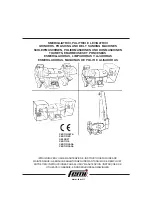
7
Original instructions
EN
accessory.
Accessory may kickback over
your hand.
c)
Do not position your body in the area
where power tool will move if kickback
occurs.
Kickback will propel the tool in di-
rection opposite to the wheel’s movement
at the point of snagging.
d)
Use special care when working corners,
sharp edges etc. Avoid bouncing and
snagging the accessory.
Corners, sharp
edges or bouncing have a tendency to
snag the rotating accessory and cause loss
of control or kickback.
e)
Do not attach a saw chain woodcarving
blade or toothed saw blade.
Such blades
create frequent kickback and loss of con-
trol.
▪ Fix the machined piece in vice or in an
-
other appropriate way.
Safety Warnings Specific for Grinding
and Abrasive Cutting-Off Operations:
a)
Use only wheel types that are recom-
mended for your power tool and the
specific guard designed for the selected
wheel.
Wheels for which the power tool
was not designed cannot be adequately
guarded and are unsafe.
b)
The guard must be securely attached
to the power tool and positioned for
maximum safety, so the least amount
of wheel is exposed towards the opera-
tor.
The guard helps to protect the operator
from broken wheel fragments, accidental
contact with wheel and sparks that could
ignite clothing.
c)
Wheels must be used only for recom-
mended applications. for example: do
not grind with the side of cut-off wheel.
Abrasive cut-off wheels are intended for
peripheral grinding, side forces applied to
these wheels may cause them to shatter.
d)
Always use undamaged wheel flanges
that are of correct size and shape for
your selected wheel. Proper wheel
flanges support the wheel thus reduc
-
ing the possibility of wheel breakage.
Flanges for cut-off wheels may be different
from grinding wheel flanges.
e)
Do not use worn down wheels from larg-
er power tools.
Wheel intended for larger
power tool is not suitable for the higher
speed of a smaller tool and may burst.
▪
Always pay attention to the wheel rota-
tion direction.
The torque reaction is in the
opposite direction of the rotation direction
at the point of binding and this is a prereq-
uisite to loosing control of the power tool.
▪
Always guide the machine in such a way
that sparks and dust can scatter away
from your body.
Power tools generate
sparks which may burn your clothes or un-
protected parts of your body.
▪
Grinding and cutting-off operations on
freshly painted metal structures is not
allowed before the paint has become
dry.
There is a risk of damp paint ignition.
▪
Cutting of flammable materials (wood,
plastics, etc.) and panel structures
“sandwich” type with flammable filling
is not allowed
.
There is a risk of fire.
▪
Grinding and cutting-off operations on
equipment operating under pressure is
not allowed.
There is a risk of explosion.
▪
Grinding and cutting-off operations of
reservoirs, pipelines, equipment, etc.,
containing at present or having con-
tained flammable or easily ignitable
substances or materials is not allowed
without first taking special precautions
to prevent fire and explosion.
There is a
risk of fire and explosion.
Additional Safety Warnings Specific for
Abrasive Cutting-Off Operations:
a)
Do not “jam” the cut-off wheel or apply
excessive pressure. Do not attempt to
make an excessive depth of cut.
Over-
stressing the wheel increases the loading
and susceptibility to twisting or binding of
the wheel in the cut and the possibility of
kickback or wheel breakage.
b)
Do not position your body in line with
and behind the rotating wheel.
When the
wheel, at the point of operation, is moving
away from your body, the possible kickback
may propel the spinning wheel and the
power tool directly at you.
c)
When wheel is binding or when inter-
rupting a cut for any reason, switch off
the power tool and hold the power tool
motionless until the wheel comes to a
complete stop. Never attempt to remove
the cut-off wheel from the cut while the
wheel is in motion otherwise kickback
may occur.
Investigate and take corrective
action to eliminate the cause of wheel bind-
ing.
d)
Do not restart the cutting operation in
the workpiece. Let the wheel reach full
speed and carefully re-enter the cut.
The










































